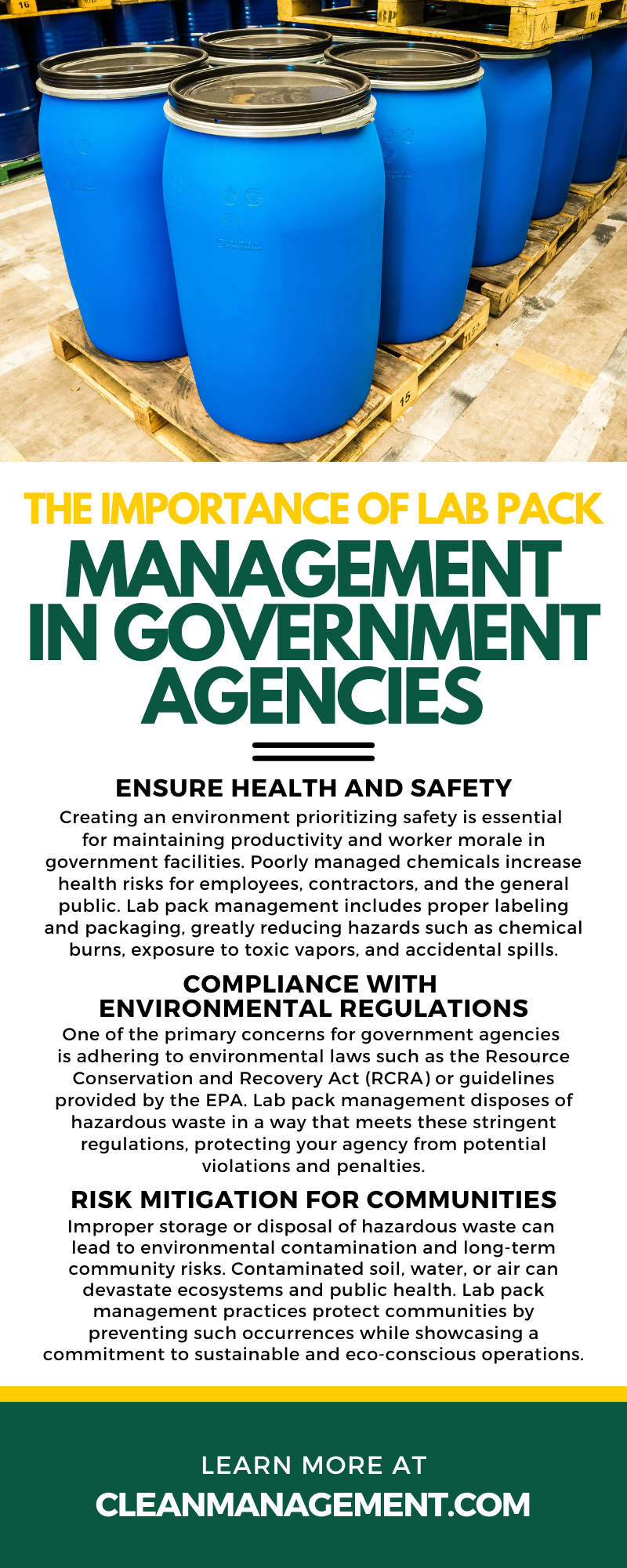The Importance of Lab Pack Management in Government Agencies

Government agencies face complex challenges in managing hazardous waste. Responsible lab pack management is critical to maintaining safety, meeting regulatory requirements, and minimizing environmental impact.
For agency managers and environmental officers, understanding how to implement effective lab pack management helps reduce health risks and improve operational efficiency. This blog highlights the importance of lab pack management within government agencies and shares key practices to incorporate.
What Is Lab Pack Management?
Lab pack management refers to identifying, segregating, packaging, and disposing of hazardous materials, typically found in laboratories or facilities, per environmental regulations. These substances can include expired chemicals, unwanted reagents, or reactive compounds. If not handled carefully, they can pose significant dangers to the public or the environment.
Why Lab Pack Management Matters for Government Agencies
Government agencies operate within strict regulatory frameworks that protect individuals and the environment. Mismanagement of hazardous waste can lead to severe consequences, including hefty fines, legal liabilities, and potential harm to workers or surrounding communities.
For example, if a public health facility fails to properly label and dispose of expired chemicals, it could face Environmental Protection Agency (EPA) violations and expose staff to toxic substances. Proper lab pack management ensures your organization meets its environmental and legal obligations while maintaining a safe workspace.
The Role of Lab Pack Services in Government Settings
Hiring professional lab pack services can streamline hazardous waste disposal. These services help identify chemicals in your inventory, safely package them according to regulatory standards, and transport them to certified disposal facilities. For agencies with limited resources, relying on these experts ensures peace of mind and compliance with legal requirements.
Ensure Health and Safety
Creating an environment prioritizing safety is essential for maintaining productivity and worker morale in government facilities. Poorly managed chemicals increase health risks for employees, contractors, and the general public. Lab pack management includes proper labeling and packaging, greatly reducing hazards such as chemical burns, exposure to toxic vapors, and accidental spills.
Compliance With Environmental Regulations
One of the primary concerns for government agencies is adhering to environmental laws such as the Resource Conservation and Recovery Act (RCRA) or guidelines provided by the EPA. Lab pack management disposes of hazardous waste in a way that meets these stringent regulations, protecting your agency from potential violations and penalties.
Risk Mitigation for Communities
Improper storage or disposal of hazardous waste can lead to environmental contamination and long-term community risks. Contaminated soil, water, or air can devastate ecosystems and public health. Lab pack management practices protect communities by preventing such occurrences while showcasing a commitment to sustainable and eco-conscious operations.
Financial Implications of Poor Waste Management
Noncompliance is costly. Agencies found guilty of neglecting proper lab pack protocols can face financial penalties and reputational damages. Additionally, cleaning up environmental contamination is an expensive and time-consuming process. Investing in appropriate lab pack management upfront can save resources and protect your agency’s budget from the burden of fines or litigation.
Essential Steps for Effective Lab Pack Management
1. Conduct a Comprehensive Chemical Inventory
Start with a detailed inventory of all hazardous materials in your facility. Identify outdated, unknown, or unnecessary substances and note their volume, condition, and risks. This initial step is crucial for determining how to classify and prioritize waste.
2. Understand Regulatory Obligations
Familiarize yourself with local, state, and federal regulations governing hazardous waste disposal. Working with certified experts in waste management can help ensure compliance with laws like the RCRA.
3. Proper Segmentation and Packaging
Each chemical or material should be properly labeled and separated based on its unique characteristics, such as flammability or reactivity. Ensure you use approved containers designed to prevent leaks and spills during transportation.
4. Hire Qualified Professionals
Experienced lab pack service providers bring expertise in safely and efficiently handling hazardous materials. They stay up-to-date with regulatory changes, transport waste, and dispose of it in an environmentally responsible manner.
5. Staff Training and Awareness
Your employees play a vital role in maintaining a safe environment. Please provide them with regular training on recognizing hazardous materials, labeling practices, and emergency protocols. Empowering staff to flag potential issues ensures a proactive approach to lab pack management.
6. Emergency Preparedness
Accidents can happen, but a strong emergency response plan equips your agency to act quickly and effectively. Keep spill kits accessible, train response teams thoroughly, and establish clear communication protocols to manage unexpected incidents confidently.
Common Challenges in Lab Pack Management
Overstocking Chemicals
Government facilities often bulk purchase chemicals to reduce costs, leading to an accumulation of unused, expired, or forgotten substances. Conduct regular audits to minimize waste and avoid unnecessary storage of potentially hazardous materials.
Mislabeling Substances
Missing or incorrect labels make lab pack management more complex and increase the risk during handling. Establish standard operating procedures for consistent and accurate labeling.
Resource Constraints
Limited budgets and staff in government agencies can make waste management feel overwhelming. Outsourcing professional lab pack services ensures efficient waste disposal without overburdening your internal team.
Benefits of Professional Expertise in Lab Pack Management
Tailored Solutions
A professional lab pack team will assess your specific needs, providing customized plans and solutions that address the unique challenges of your agency’s operation.
Reduced Liability
Outsourcing waste management to licensed providers makes your agency less likely to encounter compliance issues or mishaps during transportation or disposal.
Focus on Core Operations
When you entrust waste management to experts, agency staff can focus on their core mission while professionals handle compliance and environmental concerns.
Long-Term Sustainability Goals for Government Agencies
Sustainability is increasingly becoming a priority for government agencies around the world. By integrating lab pack management into broader sustainability initiatives, agencies can demonstrate their commitment to environmental stewardship. Proper handling of hazardous waste reduces the ecological footprint.
Devise Safe and Compliant Workplaces
Understanding the importance of lab pack management is a critical component of creating a safe, efficient, and responsible government organization. Prioritizing this process protects employees, minimizes environmental risks, and strengthens public trust in your agency’s ability to safeguard the communities it serves.
Final Thoughts
Government agencies must make lab pack management a top priority to ensure safety, regulatory compliance, and environmental stewardship. Whether you’re overseeing a public research lab, municipal water treatment facility, or educational institution, properly handling hazardous waste is critical to protecting your community.
Streamline the lab packing process by partnering with an experienced provider like Clean Management Environmental Group. Our certified professionals handle every step—from identification to disposal—so your agency can stay compliant and focused on its mission. Contact us today to learn how our lab pack services can support your sustainability goals and create a safer, more efficient operation.

